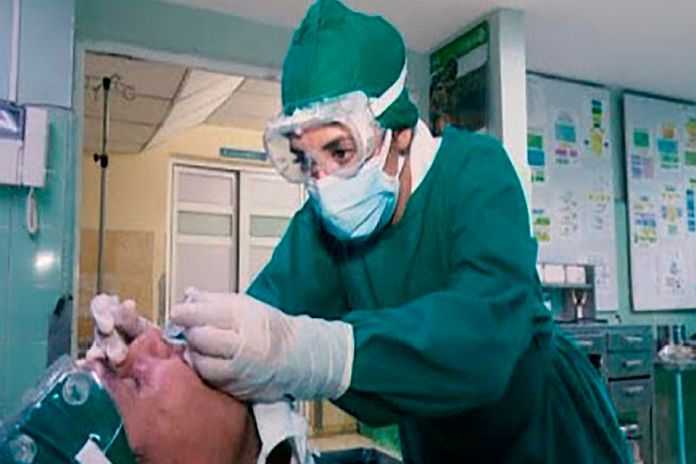By Caribbean News Global contributor
HAVANA, Cuba – Cuba has recently began massive use of a nasal drop developed in that country to face the coronavirus. The drug is called Nasalferon and it is an immunoprotectant that prevents the replication of SARS-CoV-2, the virus that causes COVID-19. The Cuban nasal drops were made by the Center for Genetic Engineering and Biotechnology (CIGB) in Havana.
Since last Thursday, they have been supplied to Cubans arriving from abroad and their cohabitants in Boyeros and Diez de Octubre, two of the municipalities with the highest population density in Havana. Cuban health authorities hope to gradually expand their supply to the entire city of Havana, where some two million people live. Nasalferon is applied nasally. One drop is applied in the morning and another at night, for a period of 10 days.
“Cohabitants must start the treatment three days before the arrival of the traveller to their homes,” the director of science and technological innovation of the ministry of public health of Cuba, Ileana Morales, explained to the press.
The distribution of the drug is in the hands of the polyclinics, which distribute it in the family physician’s offices, a territorial assistance network where a doctor and a nurse treat the community.
In Havana, there is an outbreak of COVID-19. This week an average of more than 80 daily cases were registered. The application of the drops constitutes one of the new actions to manage the pandemic. Last Saturday alone, Cuba registered a record of 365 new coronavirus infections. Since the beginning of the pandemic, it has accumulated to 14,188 cases and 148 deaths.
The basis of Nasalferon
Morales explained that Nasalferon is based on an interferon made in Cuba. This drug has been used with 93 percent effectiveness in medical personnel who work in the so-called Red Zone of the hospitals where the infected are hospitalized.
Official sources specified that as of last August, the drug had been supplied to more than 17,000 health workers. It was also received by about a thousand people considered vulnerable because they are advanced in age or have been in direct exposure to COVID-19. Scientists explain that the drug modifies the number of virus colonies present in the body, in addition to strengthening the immune system and ensuring that the infected person does not develop severe symptoms.
Because it is used nasally, it has the advantage of directly affecting the area of the body where the greatest amount of virus is concentrated, so it quickly alters its reproduction. The Nasalferón was used experimentally in the Cuban province of Ciego de Avila. After the tests, the CIGB researcher, Hugo Nodarse, observed that “the preventive effect has a long-term projection” and stressed that it does not present “any significant adverse side effects”.
Cuba is also currently developing four vaccines against the coronavirus. The developments are in different phases of clinical trials to comply with the government’s intention to immunize the entire population of over 12 million people this year.
The Finlay Vaccine Institute (IVF) in Havana, has two vaccines underway, called Soberana-01 and Soberana-02. Meanwhile, the Center for Genetic Engineering and Biotechnology was responsible for the production of Abdala and Mambisa, the latter of which is being administered nasally.
This article was translated from the original Spanish by Comrade Peter Lansiquot, First Vice President of the Saint Lucia – Cuba Humanistic Solidarity Association (HSA); President of the Saint Lucia – Venezuela Solidarity & Integrationist Movement (SLVSIM); and Chairman of the People’s Distress Fund of Saint Lucia (PDFSL).








This is good news and the Caribbean should support Cuba because the others out there are not to be trusted.